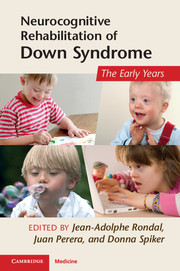Book contents
- Frontmatter
- Contents
- List of contributors
- Preface
- Acknowledgments
- Section 1 Definition, history, methodology, and assessment
- Section 2 Genetics, brain, and animal models
- Section 3 Pharmacological and medical management and treatment
- Section 4 Early development and intervention
- Section 5 Therapeutic perspectives
- Conclusions
- Index
Preface
Published online by Cambridge University Press: 05 July 2011
- Frontmatter
- Contents
- List of contributors
- Preface
- Acknowledgments
- Section 1 Definition, history, methodology, and assessment
- Section 2 Genetics, brain, and animal models
- Section 3 Pharmacological and medical management and treatment
- Section 4 Early development and intervention
- Section 5 Therapeutic perspectives
- Conclusions
- Index
Summary
The study of Down syndrome, the most frequent genetic disorder affecting development, has led to a rich body of interdisciplinary research in genetics, neuroscience, psychology, and education. These collaborations have not only promoted a better understanding of the condition itself, but also favored an increasing recognition that many neurodevelopmental disorders have strong genetic components even though their genetic underpinnings still need to be better understood and the characteristics of their neurocognitive developments better specified. Fifty years of intensive research on Down syndrome following the discovery of the genetic basis of the syndrome have lead to a reasonable understanding of many of its major developmental aspects. On this basis, it has become possible to define an interdisciplinary framework for locating, justifying, and assessing early rehabilitative intervention.
The purpose of this book is to represent some of the major ways in which a comprehensive neurocognitive rehabilitation program may be conceptualized and carried out, taking into account the spectrum of specific knowledge available from the genotype, brain development, and the behavioral phenotype. By comprehensive, we mean a neurocognitive approach connected transactionally with the major therapeutic endeavors in neighboring fields such as neurogenetics, experimental environmental enrichment in animal models, molecular and genic therapies (viewed as synergistic with neurocognitive rehabilitation), pharmacology, pediatrics, and cardiology for infants with Down syndrome.
- Type
- Chapter
- Information
- Neurocognitive Rehabilitation of Down SyndromeEarly Years, pp. xi - xiiPublisher: Cambridge University PressPrint publication year: 2011



